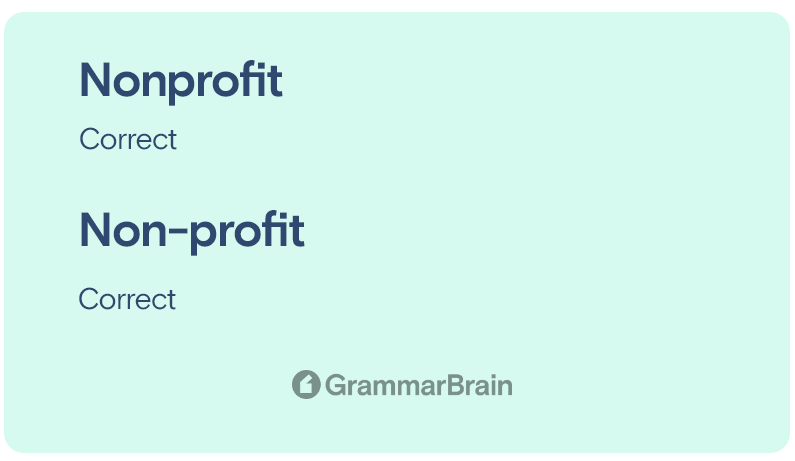Is a non-profit organization or nonprofit organization profitable? An organization that we run for not making any profit is gaining popularity. But there is one question that arises. When we discuss non-profit or nonprofit organizations. The question is: Is it non-profit or nonprofit?
Both non-profit and nonprofit mean the same thing: they are not run for profit—however, the question of whether it is non-profit or nonprofit arises. There is no global agreement.
In this article, we will look at the meanings of non-profit and profit. Also, we will consider the differences between them and how to use them correctly.
Difference between Non-Profit and Nonprofit
Many organizations use the terms interchangeably, indicating no discernible difference between the two. The Oxford English Dictionary traditionally used the term non-profit, but the new American edition accepted the version without a hyphen.
The Oxford English Dictionary prefers hyphenated words, while the New Oxford English Dictionary prefers without hyphens. This demonstrates that there is no difference in meaning.
| Word | Spelling |
| Non-profit | not making or conducted primarily to make a profit. |
| Nonprofit | not making or conducted primarily to make a profit. |
Meaning and grammar use
What does the term “non-profit” mean? Non-profit is a noun that we can also use as an adjective. A non-profit is “not for profit” or “not conducted for profit.” Organizations that run for charity are an example. Although both terms have the same meaning, grammarians have some rules to follow when using them.
They prefer to use the hyphenated term non-profit as an adjective to emphasize the noun that follows the term—for example, a non-profit organization, a non-profit business, etc. And the term ‘nonprofit’ without hyphenation is used as a noun. For example, non-profit (adjective) organizations do not make profits, but these nonprofits (noun) do charitable work.
The terms ‘non-profit’ or ‘nonprofit can be used as an adjective or a noun. — a nonprofit is an organization that benefits the public good rather than making money for stockholders or owners. There are educational, religious, and public health nonprofits, among many others.

Sentence examples for the term “non-profit”
- The center is a non-profit organization.
- They will be run on a non-profit basis.
- He claims that other non-profit organizations will follow suit if churches are granted an exemption.
- The non-profit model in the pharmaceutical industry can grow with such cooperative public support.
- I apologize. We can’t take any dog, ma’am. We are not the county’s animal control department. This is a non-profit, private shelter.
- They discuss Alex’s campaign job, Henry’s non-profit projects, and their appearances.
Sentence examples for the term “nonprofit”
- Organizations must be nonprofit to be eligible for funds.
- Patents would be shared between nonprofits and newly transformed for profits with oversight.
- The nonprofits would be supported by foundations, taxes, and a small portion of drug sales revenue.
- Most of us were in our thirties and working in various fields, from banking to government to nonprofits.
- He had accepted an offer from Liberty in North Korea, the nonprofit that had sponsored his first trip to the United States.
Conclusion
From this discussion, we learned that nonprofit and non-profit are interchangeable terms. A company or organization that uses surplus revenue for purposes other than the benefit of stakeholders is non-profit. Non-profits include hyphens, but nonprofits should never include hyphens.
Inside this article
Fact checked:
Content is rigorously reviewed by a team of qualified and experienced fact checkers. Fact checkers review articles for factual accuracy, relevance, and timeliness. Learn more.
Core lessons
Glossary
- Abstract Noun
- Accusative Case
- Anecdote
- Antonym
- Active Sentence
- Adverb
- Adjective
- Allegory
- Alliteration
- Adjective Clause
- Adjective Phrase
- Ampersand
- Anastrophe
- Adverbial Clause
- Appositive Phrase
- Clause
- Compound Adjective
- Complex Sentence
- Compound Words
- Compound Predicate
- Common Noun
- Comparative Adjective
- Comparative and Superlative
- Compound Noun
- Compound Subject
- Compound Sentence
- Copular Verb
- Collective Noun
- Colloquialism
- Conciseness
- Consonance
- Conditional
- Concrete Noun
- Conjunction
- Conjugation
- Conditional Sentence
- Comma Splice
- Correlative Conjunction
- Coordinating Conjunction
- Coordinate Adjective
- Cumulative Adjective
- Dative Case
- Determiner
- Declarative Sentence
- Declarative Statement
- Direct Object Pronoun
- Direct Object
- Diction
- Diphthong
- Dangling Modifier
- Demonstrative Pronoun
- Demonstrative Adjective
- Direct Characterization
- Definite Article
- Doublespeak
- False Dilemma Fallacy
- Future Perfect Progressive
- Future Simple
- Future Perfect Continuous
- Future Perfect
- First Conditional
- Irregular Adjective
- Irregular Verb
- Imperative Sentence
- Indefinite Article
- Intransitive Verb
- Introductory Phrase
- Indefinite Pronoun
- Indirect Characterization
- Interrogative Sentence
- Intensive Pronoun
- Inanimate Object
- Indefinite Tense
- Infinitive Phrase
- Interjection
- Intensifier
- Infinitive
- Indicative Mood
- Participle
- Parallelism
- Prepositional Phrase
- Past Simple Tense
- Past Continuous Tense
- Past Perfect Tense
- Past Progressive Tense
- Present Simple Tense
- Present Perfect Tense
- Personal Pronoun
- Personification
- Persuasive Writing
- Parallel Structure
- Phrasal Verb
- Predicate Adjective
- Predicate Nominative
- Phonetic Language
- Plural Noun
- Punctuation
- Punctuation Marks
- Preposition
- Preposition of Place
- Parts of Speech
- Possessive Adjective
- Possessive Determiner
- Possessive Case
- Possessive Noun
- Proper Adjective
- Proper Noun
- Present Participle
- Prefix
- Predicate



